Writing Consultation Appointments
The GWC is open for the 2026 Winter Quarter, from January 5th through March 20th (the end of Finals Week). We are open for appointments as follows:
Mondays: 9:30am-8:00pm
Tuesdays: 9:00am-7:30pm
Wednesdays:9:30am-8:00pm
Thursdays: 9:00am-7:30pm
Fridays: 9:00am-8:00pm
Saturdays:10:00am-12:00pm
Sundays:Closed
In-person appointments are available Mondays-Thursdays. Click on "In-Person Writing Appointment Locations" below for information on locations and times.
The GWC uses Handshake for appointments; to go to Handshake directly, click the button below.
In-Person Writing Appointment Locations
Biomedical Library (consultations take place in Collaboration Study Room A)
Thursdays, 1:00pm-5:00pm
Young Research Library(consultations take place near the "Research Help Desk" by Cafe 451)
Mondays, 10:00am-12:00pm
Tuesdays, 10:00am-1:00pm
Science and Engineering Library/Boelter (consultations take place in group study room 8251A)
Mondays, 6:00pm-8:00pm
Wednesdays, 4:00pm-6:00pm
Graduate Student Resource Center (GSRC) (consultations take place in the Student Activities Center)
Tuesdays, 9:00am-5:00pm
Wednesdays, 2:00pm-4:00pm
Thursdays, 9:00am-11:00am; 5:00pm-7:00pm
About the Graduate Writing Consultants
Read First
All writing consultants have been trained to help graduate and professional students with general writing issues in any field, but it can be helpful to work with someone in a field more similar to your own. We encourage you to review the consultant bios before making an appointment.
Foreign languages: a few of our writing consultants feel comfortable reading work in other languages. See bios for more information.
Aidan
Department: Ecology and Evolutionary Biology
Writing Specialities: Academic Writing, Application Documents, Article Manuscripts, Fellowships/Grants, Lab Reports, Quantitative Methods, STEM, Style/Flow, Writing Process, Zotero
Pronouns: he/him
Bio: Aidan is a PhD candidate studying evolutionary developmental biology. His research focuses on the rules that govern how variation develops in animals. Aidan earned a BSc in Biology from McGill University, where he studied developmental biology and paleontology. As a graduate student, he has received the National Science Foundation Graduate Research Fellowship (NSF GRFP). Aidan’s ~favorite~ punctuation mark is the tilde, for its ability to add ~special emphasis~ with its squiggly arms.
AJ
Department: Chemistry & Biochemistry
Writing Specialties: Fellowships/Grants, Academic Writing, Oral Presentations, Academic Writing, Professional Writing, Application Documents, Writing Process, Style/Flow, Revision Strategies, Quantitative Methods, Qualitative Methods, Non-academic writing, Zotero (basic)
Pronouns: she/her
Bio: AJ (she/her/hers) is a PhD candidate in the Department of Chemistry and Biochemistry. Her research covers the optical and colloidal properties of sunscreen materials/formulations, dermatological research, and developing cosmetic formulations that address the needs of darker skin tones. She earned a B.S. in Biology from Northeastern University, and was born and raised in Texas. As a graduate student, AJ has earned the National Science Foundation Graduate Research Fellowship (GRFP), the UCLA Graduate Council Diversity Fellowship, the Center for Diverse Leadership in Science Early Career Fellowship, a Goodman-Luskin Microbiome Center research grant, and served as a National Institute of Health Chemical Biology Interface Associate Fellow. She has published broadly, from first-author research articles to art reviews, to columns, and holds experience with supporting students through both preparation and execution of writing drafts. Outside of research, AJ enjoys puzzles, writing, and being a mother to her calico cat, Junie. Her favorite punctuation mark is the ellipsis…
Amelia
Department: Comparative Literature
Writing Specialties: English Language Learners, Academic Writing, Application Documents, Humanities & Arts, Cultural Studies, Writing Process, Revision, Editing, Grammar/Mechanics, Style/Flow, Master’s Thesis, Zotero (basic), Obsidian
Pronouns: she/her
Bio: Amelia is a PhD student in Comparative Literature. Her research interests include Memory Studies, Turkish literature and culture, Latin American literature and culture, and interdisciplinary approaches to literary study. She has an MA in Comparative Literature from the University of London’s School of Oriental and African Studies, where she studied critical theory and Turkish and Arabic literatures (in translation!). Before attending UCLA, Amelia worked as an English as a Foreign Language (EFL) instructor for university students and adult learners in Japan, Turkey, and Colorado. Her favorite punctuation mark is the em dash, because it can get her out of punctuation pickles and because it adds a little extra drama to her writing.
Andrew
Department: Sociology
Writing Specialties: Academic Writing, Application Documents, Professional Writing, Social Sciences, Qualitative Methods, Writing Process, Style/Flow, Zotero
Pronouns: he/him
Bio: Andrew is a PhD candidate in the Department of Sociology. He studies social and political responses to climate change, with a current focus on adaptation to sea level rise in coastal areas. Andrew has an MSc in political sociology from the London School of Economics and a BA from McGill University. His professional background includes teaching English in Iksan, South Korea and providing one-on-one tutoring in English Composition. Before attending UCLA, Andrew worked in arts education, where he produced and edited a professional publication. He is the recipient of a Graduate Research Mentorship Award. His favorite punctuation mark—even though his many asides might indicate otherwise—is the period.
Brenda
Department: English
Writing Specialties: Academic Writing, Professional Writing, Humanities & Arts, Application Documents, Oral Presentations, Conference Proposals/Papers, Cultural Studies, Critical Race Theory, Gender and Sexuality Studies, Critical Theory, Writing Process/Revision Strategies, Article Manuscripts, Fellowships/Grants, Zotero, Scrivener, Notion
Pronouns: she/her
Bio: Brenda is a PhD candidate in the English department at the University of California, Los Angeles. Her dissertation explores beauty as an embodied cultural project by which questions of desire, gender, and racial belonging are adjudicated. Her research interests include Asian diaspora studies, twentieth century transnational visual culture, critical race and ethnic studies, cinema and media studies, and feminist and queer of color critique. She received her BA in English Literature with a minor in Creative Writing from the University of Pennsylvania and an MPhil in Modern and Contemporary Literature from the University of Cambridge. She is a Cota-Robles Fellow, and has been the recipient of the GRSM, the GRM, and the University of California Office of the President (UCOP) Dissertation Year Award.
Carolyn
Department: Anthropology
Writing Specialties: Academic Writing, Professional Writing, Policy Writing, Social Sciences, Fellowships/Grants, Application Documents, Qualitative Methods, Writing Process, Grammar/Mechanics, Style/Flow, English Language Learners, Zotero (basic), Scrivener (basic), Notion (basic)
Pronouns: she/her
Bio: Carolyn is a PhD student in the Department of Anthropology. She studies intercultural communication in workplaces and ideologies of linguistic competence in the labor market. As a Graduate Student Researcher at the UCLA Labor Center, she learned how to write policy reports with community partners employing a research justice framework. Additionally, as a Korean/Spanish to English translator, she has experience translating a range of genres including: art catalogues, workplace documents, subtitles, and webtoons. Carolyn has received the NSF GRFP, GSRM, GRM, and the Institute of American Cultures Research Grant. Her favorite punctuation mark is the semicolon because it is used iconically in Korean texting to convey embarrassment or awkwardness (due to its resemblance to sweat drops). (^_^);;
Daniel
Department: Materials Science and Engineering
Writing Specialties: STEM, Style/Logical Flow, Academic Writing, Application Documents, Article Manuscripts, Fellowships/Grants, Zotero, LaTeX
Pronouns: he/him
Bio: Daniel is a PhD student who is broadly doing research in nanophotonics and optoelectronics. He is currently interested in various photonic strategies that can break Kirchhoff’s law of thermal radiation in ways that can be useful for energy harvesting applications. He earned a BS in Engineering Physics from UC Berkeley, where he studied various theoretical aspects of twisted bilayer photonic crystals. As a graduate student, he has received the Department of Defense National Defense Science and Engineering Graduate fellowship (DoD NDSEG). Outside of graduate school, Daniel likes to go for hikes in the LA area and visit national parks on the West Coast. Daniel’s favorite punctuation mark is the semicolon since it acts like a handshake between two independent clauses.
Ebony
Department: Gender Studies
Writing Specialties: Academic Writing, Humanities, Fellowship/Grants, Application Documents, Style/Flow, Revision Strategies, Writing Process, Gender and Sexuality Studies, Black Studies, Critical Theory, Cultural Studies
Pronouns: they/them
Bio: Ebony (they/them) is a Eugene V. Cota-Robles Fellow, PhD Candidate in the Department of Gender Studies, and a former co-chair of the Black Feminism Initiative here at UCLA. Their work addresses Transatlantic Slavery and its carceral afterlife with a focus on the entanglements between antiblackness, antifatness, and ableism. Ebony holds a B.A. in Ethnic Studies from the University of Oregon and a Master’s in Education from Portland State University with a Graduate Certificate in Gender, Race, and Nations. Among their research awards and fellowships, some include the Dissertation Year Fellowship, Jean Stone Dissertation Award, Intersections of Carceral Studies and Black Studies Residency Award, Race and Digital Justice Fellowship, Institute of American Cultures Graduate and Predoctoral Fellowship with the Bunche Center for African American Studies, Keck Humanistic Inquiry Research Award, Emerge Fellowship and Residency with the Paul K. Longmore Institute on Disability Fellowship, Graduate Summer Research Mentorship Fellowship, Alisa Bierria Black Feminism Initiative Fellowship, and the Black Feminist Interdisciplinary Graduate Research Grant.
Elias
Department: Psychology & Communication (Cognitive Track)
Writing Specialties: Academic Writing, Application Documents, Fellowships/Grants, Article Manuscripts, Quantitative Methods, STEM, Social Sciences, Master's Thesis, Revision Strategies, Writing Process, Style/Flow
Pronouns: he/him
Bio: Elias is a PhD student in Psychology and Communication at UCLA, where he works at the intersection of cognitive and evolutionary approaches to human behavior. His research explores the psychological foundations of emotion, belief, and decision-making, with published work on topics including awe, disgust, thermoregulation, psychedelic-assisted therapy, and the relationship between personality and critical thinking. His articles have appeared in Philosophical Transactions of the Royal Society, Motivation and Emotion, Personality and Individual Differences, The Journal of Psychoactive Drugs, and Physiology and Behavior. He is also a contributing author to the APA Handbook of Evolutionary Psychology and multiple entries in the Encyclopedia of Sexual Psychology and Behavior. Elias earned his BA in Psychology with a minor in Philosophy from Colorado Mesa University, and his MA in Psychological Science from the University of Colorado. At UCLA, he is a member of the Social Minds Lab and has received the Eugene V. Cota-Robles Fellowship, the Graduate Research Mentorship Award, and the Graduate Summer Research Mentorship Award. He has presented his research at national conferences such as the Society for Personality and Social Psychology (SPSP) and the Human Behavior and Evolution Society (HBES), where he was nominated for the New Investigator Award. Beyond research, Elias has extensive teaching and mentoring experience, having served as a teaching assistant in evolutionary psychology, general psychology, and statistics courses, as well as a writing consultant supporting students across disciplines. His favorite punctuation mark is the question mark, because it embodies curiosity.
Elle
Department: Neuroscience
Writing Specialties: Academic Writing, Fellowships/Grants, Application Documents, STEM, Writing Process, Revision Strategies, Editing Strategies
Pronouns: she/her
Bio: Elle is a PhD candidate and serves as a Fellowship Specialist, focusing specifically on National Institutes of Health (NIH) grants. She attended the University of Chicago as a QuestBridge Scholar and now researches neural repair after stroke, investigating potential stroke treatments in the Carmichael Lab. As a UCLA student, she has received the Graduate Council Diversity Fellowship, the Achievement Rewards for College Scientists Fellowship, and the Predoctoral Individual National Research Service Award (NRSA F-31 Diversity Fellowship from the National Institute of Neurological Disorders and Stroke). Outside of the lab, Elle is a personal finance educator, the layout editor for Chicago Business, a pyrography artist, a volunteer for non-profits, and a camper. Her favorite punctuation mark is the semicolon, as she loves complex lists and relating sentences! (Note: Elle is available by request for NIH F30 and F31 application support--Thursday afternoon appointments are preferred but other times may be available. Please send requests to the GWC email.)
Emma
Department: Biological Anthropology
Writing Specialties: Academic Writing, Social Sciences, Fellowships/Grants, Style/Flow, Revision Strategies, Mixed Methods, Writing Process, Application Documents
Pronouns: she/her
Bio: Emma is a PhD student in Biological Anthropology. Her research interests include human evolutionary adaptations to extreme climate and characterizing genotype-environmental interactions. She has a B.A. in Anthropology from the University of Kansas. She is a recipient of the National Science Foundation Graduate Research Fellowship (NSF GRFP) and the intramural Genomic Analysis Training Program Fellowship (GATP). In her spare time, she enjoys drawing and painting.
Ezequiel
Department: Art History
Writing Specialties: Academic Writing, Application Documents, Fellowships/Grants, Humanities & Arts, Cultural Studies, Writing Process, Revision, Editing, Style/Flow, Oral Presentations, Conference Proposals/Papers
Pronouns: he/him
Bio: Ezequiel is a PhD Candidate in the Department of Art History, where he focuses on Latin American and Latinx art. Upon entering UCLA, Ezequiel was awarded the Eugene V. Cota-Robles Fellowship. He has since earned the Keck Humanistic Inquiry Research Award, the Graduate Summer Research Mentorship Award, and Graduate Research Mentorship Fellowship. Ezequiel has completed extensive coursework in Chicana/o & Central American studies, Native Studies, and gender studies throughout his time at UCLA. He has also published articles in both English and Spanish. His favorite punctuation mark is “?” because asking questions gives life meaning, and—as a first gen student—he encourages others to raise them.
Harmeet
Department: Education
Writing Specialties: Social Sciences, Oral Presentations, Public Speaking, Cultural Studies, Critical Race Theory, Academic Writing, Professional Writing, Fellowships/Grants, Application Documents, Academic Writing, Writing Process, Style/Flow, Revision Strategies, Quantitative Methods, Qualitative Methods, Creative Writing
Pronouns: she/her
Bio: Harmeet is a PhD candidate and mixed methods scholar in the Higher Education and Organizational Change PhD program. She is a first-generation community college transfer student who earned a BA in Sociology from UC Merced and an MA in Education from UCLA. She has mentored students and reviewed their professional and academic documents (which ranged from resumes, CVs, graduate school, scholarship, fellowship, and job applications). She also has experience supporting students when they are planning, preparing, and perfecting their oral presentations (including research presentations, professional interviews, and conferences). Harmeet is researching the resilience of Punjabi Women’s educational trajectories during three moments of historical oppression through qualitative and historical methods and the use of asset-based critical theories. Outside of research, Harmeet loves music, creative writing, traveling outside of the U.S., and exploring local LA events and activities. Her favorite punctuation mark is “?” because it allows her to learn more about someone’s personality, perspectives, and narratives.
Janel
Department: Chicana/o and Central American Studies
Writing Specialties: Fellowships/Grants, Creative Writing, Revision Strategies, Cultural Studies, Critical Race Theory, Humanities & Arts, Professional Writing, Style/Flow
Pronouns: she/her/ella
Bio: Janel is a poet, educator, and scholar of U.S. Central American Literature. Her research analyzes contemporary works by diasporic Central American poets and investigates the ways that poetry can be used to counteract narrative silencing and to reclaim familial and cultural (hi)stories. Prior to joining UCLA, she earned a BA in English from Dickinson College, and received a Marshall Scholarship to pursue graduate study in the UK. She holds dual master’s degrees in Latin American Studies from the University of Cambridge, and in Creative Writing and Education from Goldsmiths, University of London. As a graduate writing consultant, she specializes in supporting students with competitive fellowship applications, with a particular focus on working with first-generation students. She has extensive training in academic writing tutoring and in pedagogical strategies for strengthening creative writing. Janel has received grants and fellowships from the Paul & Daisy Soros Fellowship for New Americans, UCLA’s Graduate Summer Research Mentorship, the Eugene V. Cota Robles fellowship, the California Arts Council, the National Association for Latino Arts and Culture, and more. Her favorite punctuation mark is the em dash—quite simply because it’s just so good. (Note: Janel isn't working regular appointments in Fall 2025 but may be available by request for Soros fellowship writing support. Please send requests to the GWC email.)
Kiana
Department: Education
Writing Specialties: Academic Writing, Application Documents, Social Sciences, Article Manuscripts, Qualitative Methods, Fellowships, Writing Process, Revision Strategies, Style/Flow, Editing Strategies
Pronouns: she/her
Bio: Kiana is a PhD candidate in the School of Education and Information Studies. Her dissertation research focuses on the racialized experiences of foreign-born faculty working in U.S. higher education. Prior to this, she received a B.A. at Colgate University where she double majored in Behavioral Neuroscience and Educational Studies. She has published in both science and social science journals, and presented at national and international conferences. She has received intramural fellowships including the Graduate Summer Research Mentorship and Bunche Fellows Program Summer Funding. Kiana also helps high school students working on undergraduate application documents such as activity lists and personal statements. Her favorite punctuation mark is a period because sometimes, simple really is better.
Leezet
Department: Psychology
Writing Specialties: Fellowships/Grants, Academic Writing, Social Sciences, STEM, Statistics, Statistical Reporting, Quantitative Methods, Critical Race Theory, Application Documents, Oral Presentations, Writing Process, Style/Flow, Revision Strategies, Editing Strategies, Master’s Thesis
Pronouns: she/her/hers
Bio: Leezet is a PhD Candidate in Psychology who specializes in social cognitive neuroscience. Her current research investigates how people from dominant and marginalized racial groups understand and experience our racialized social world, using both social neuroscience and computational linguistics approaches. Over the course of her graduate career, she has been awarded a National Science Foundation Graduate Research Fellowship, a UCLA Graduate Research Mentorship Fellowship, a UCLA Graduate Summer Research Fellowship, a Eugene V. Cota-Robles Fellowship, and a UCLA Alumni Fellowship. Leezet graduated from Princeton University with a BA degree in Neuroscience and a strong background in African American Studies, Critical Race Theory, and Science, Technology, and Society (STS) Studies. Before pursuing her PhD, she gained experience in machine learning and artificial intelligence (AI) development while working as a data scientist for a technology start-up. Her favorite punctuation mark—which she admittedly overuses—is the em dash.
Lika
Department: Comparative Literature
Writing Specialties: Academic Writing, Non-Academic Writing, Application Documents, Humanities & Arts, Fellowships/Grants, Gender & Sexuality Studies, Writing Process, Editing Strategies, Style/Flow, Zotero (basic)
Pronouns: she/her, they/them
Bio: Lika is a PhD candidate in comparative literature. Lika’s work examines concepts and literary representations of reproduction, bodily autonomy, motherhood and non-motherhood, and family abolition in feminist philosophy and speculative fiction from France and America (late 1960s-present). Lika holds B.A. degrees from the University of Wisconsin-Madison in English and French literature and an M.A. in comparative literature from UCLA. She has received a Dissertation Year Award (DYA), Graduate Research Mentorship (GRM) Award, Graduate Summer Research Mentorship (GSRM) Award, FLAS Academic Year Language Study Fellowship, CERS Summer Language Study Grant, CERS Pre-Dissertation Research Grant, and CSW Travel Research Grant. Prior to graduate school, Lika worked in academic administration and adult and continuing education. Her favorite punctuation = the ( ) and the …
Lissy
Department: Chemistry and Biochemistry
Writing Specialties: Academic Writing, Editing/Revision Strategies, IRB Documents, Lab Reports, Oral Presentations, Writing Process, Zotero (basic), LaTeX (basic), Notion (basic)
Pronouns: she/her
Bio: Lissy is an analytical chemistry PhD student. Her research at UCLA focuses on developing diagnostic and prognostic technologies using nuclear magnetic resonance (NMR) spectroscopy. Before starting at UCLA, Lissy earned a bachelor's degree with a double major in chemistry and history from Vanderbilt University. After graduating, she worked as a translational research coordinator at Vanderbilt University Medical Center, where she helped manage several clinical studies aimed at determining environmental risk factors in the development of asthma and other allergic diseases. Her favorite punctuation marks are commas, specifically Oxford commas, because they are crucial for complexity, correctness, and clarity.
Marilyn
Pronouns: she/her
Bio: Marilyn Gray is the director of the UCLA Graduate Writing Center. She has a PhD in Slavic Languages and Literatures from UCLA. Her dissertation examines Mikhail Bakhtin’s thought and narrative theory from the perspective of Russian theological anthropology. After completing her BA in Slavic Languages and Literatures at Stanford University, she lived and worked in Moscow for four years. During her graduate work at UCLA, she worked for the Center for Digital Humanities assisting faculty with instructional technology and taught Russian language and English composition. She is a big fan of the em-dash and semi-colon when used judiciously.
Michael
Department: Political Science
Writing Specialties: Academic Writing, Professional Writing, Humanities, Social Sciences, Application Documents, Oral Presentations, Public Speaking, Cultural Studies, Critical Race Theory, Gender and Sexuality Studies, Writing Process, Revision, Editing, Grammar/Mechanics, Style/Flow, English Language Learners, Master’s Thesis, Creative Writing, Narrative Writing
Pronouns: he/him
Bio: Michael is a PhD Candidate in Political Science, focusing on political theory. He works on democratic theory, organizing, social movements and the history of political thought. His circuitous academic career has led him to get degrees in English, Philosophy, Education and Gender Studies. He has been tutoring writing since college and enjoys the challenge of reading across disciplines. Beside his academic work, he is a sporadic book reviewer and writer for publications such as Jewish Currents and Public Books. His favorite punctuation mark is the em-dash because of its variety of uses and because it makes long sentences readable.
Mykel
Department: Molecular Biology
Writing Specialties: Application Documents, Article Manuscripts, Fellowships/Grants, Statistical and/or Quantitative Descriptions, and Oral Presentations/Public Speaking
Pronouns: he/him
Bio: Mykel is a first-generation Jamaican-American PhD student from the Bronx. The language he thinks in is a blend of African American Ebonics, and Jamaican Patois. He’s spent most of his life living in predominantly Hispanic communities. Speaking of language, with the support of the National Science Foundation Graduate Research Fellowship Program (NSF-GRFP), Mykel is deciphering the grammar and syntax of the complex language of cis-regulatory element-mediated gene expression (focusing on enhancers, not gene promoters). Passionate about science communication, Mykel has taught and mentored students at the middle school, high school, college, graduate, and post graduate levels, on both the East and West, Coasts. Outside of lab, he is an athlete and artist, emphasizing discipline and creativity, across fields. His favorite punctuation marks are the comma, and semi-colon; because he has lots of thoughts, that he likes to point out the connections between.
Noura
Department: Cinema and Media Studies
Writing Specialties: Academic Writing, Application Documents, Oral Presentations, Cultural Studies, Humanities, Critical Race Theory, Gender and Sexuality Studies, Writing Process, Style/Flow, Editing/Revision Strategies
Pronouns: she/her
Bio: Noura is a PhD student in Cinema and Media Studies. Her research explores how cultural workers navigated activism and censorship in the Classical Hollywood period. She enjoys archival work and is especially interested in viewing film history through a global lens, tracing connections across communities and social movements. Passionate about public history and expanding access to knowledge, she has presented her work at the Society for Cinema and Media Studies, the Popular Culture Association, and the USC Hollywood Conference. Her favorite punctuation is the exclamation point because writing benefits from a touch of dramatic flair!
Soham
Department: Civil and Environmental Engineering
Writing Specialties: Academic Writing, Application Documents, STEM, Fellowships/Grants, Article Manuscripts, Oral Presentations, Quantitative Methods, Writing Process, Revision, Style/Flow, Zotero (basic)
Pronouns: he/him
Bio: Soham is an Environmental Engineering PhD Candidate and a NSF GRFP Fellow at UCLA. His research focuses on the bioremediation of 1,4-dioxane and other environmental contaminants and the fate and transport of antibiotic resistance genes. Soham attended UCSB where he majored in Molecular Biology & Biochemistry and Environmental Studies. Before beginning his doctoral studies, he worked in wetland restoration, seaweed aquaculture, and air quality monitoring in Southern California. Outside of work, Soham loves to cook, hike in LA, visit national parks, read, and play basketball! His favorite punctuation marks are parentheses as he always has so much (yet so little) to say.
Victoria
Department: Sociology
Writing Specialties: Academic Writing, Professional Writing, Social Sciences, Policy Writing, Fellowships/Grants, Application Documents, Article Manuscripts, Oral Presentations, Qualitative Methods, Critical Race Theory, Writing Process, Revision, Master’s Thesis, Style/Flow
Pronouns: she/her
Bio: Victoria is a PhD candidate in the Sociology department. She studies urban governance, redevelopment, policing, and race. She holds a B.A. in Leadership and Public Policy from the University of Virginia. Before UCLA, Victoria worked at a social policy research institution, where she produced policy reports and memos. She has received intramural fellowships including the Graduate Research Mentorship Award and Graduate Summer Research Mentorship Awards, and extramural fellowships from the Russell Sage Foundation and the Haynes Lindley Foundation. Her favorite punctuation mark is the semicolon.
Xochitl
Department:Ecology and Evolutionary Biology
Writing Specialties:Academic Writing, Application Documents, STEM, Fellowships/Grants, Article Manuscripts, Oral Presentations, Quantitative Methods, Revision, Editing
Pronouns: she/they
Bio: Xochitl is a PhD candidate studying behavioral ecology. Her research focuses on the long-term survival consequences of early-life adversity in a wild population of yellow-bellied marmots. Xochitl earned a BA in “human ecology” with a focus on wildlife ecology and evolution from the College of the Atlantic—a small, liberal arts college in Maine. Xochitl was born in Nicaragua, but grew up in Italy and England, where she earned the International Baccalaureate Diploma. As a graduate student Xochitl has received the NSF GRF, honorable mentions for the Ford Foundation Pre-Doctoral Fellowship, the UCLA Graduate Council Diversity Fellowship, and several small research grants. She has also published and reviewed a few scientific journal articles and presented her research at academic conferences. Xochitl loves to be outdoors, hiking and photographing wildlife, unless she’s indoors crocheting. Her favorite punctuation is the em dash—the most dramatic pause. However, when it comes to emails and more casual writing, she can’t help but overuse parentheses (because there is always an extra idea waiting to burst forth) in a sort of whisper-like tone.
Support for Fellowships and Grants
The GWC is not currently offering fellowship drop-in hours, but we are offering a full schedule of regular appointments. If you would like to know which consultants have received a particular fellowship, please review the consultant bios.
If you would like to request access to examples of successful fellowship essays, please click here.
If you have any questions about fellowship support, please email gwc@gsa.asucla.ucla.edu.
For more information about GWC fellowship support, go to: https://gwc.gsrc.ucla.edu/fellowship-support
Activating Your Handshake Account
Every UCLA student already has a Handshake account. To activate your account, go to ucla.joinhandshake.com and click the blue button labeled “University of California, Los Angeles Sign On”.
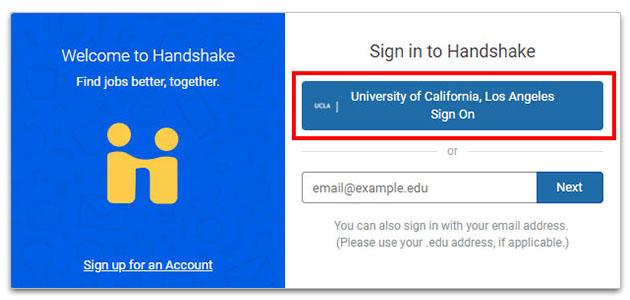
From there, you'll be taken to the UCLA Sign-in page, where you should enter your UCLA Login ID and password.
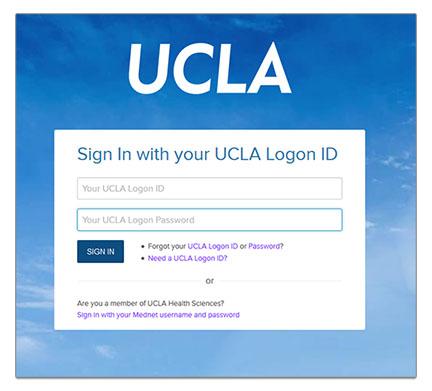
If you are signing in to Handshake for the first time, you'll be prompted to activate your account. At this screen, you will also be able to choose whether you'd like your Handshake profile to be public.
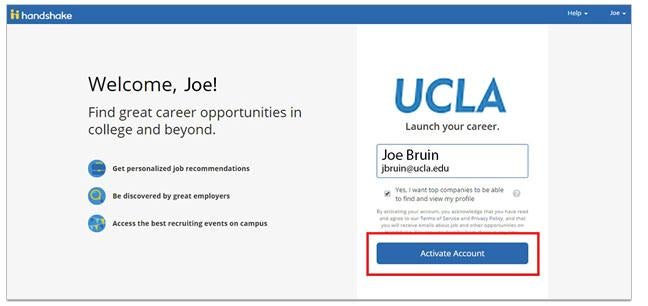
Note that you do not need to make your profile public in order to make an appointment at the Graduate Writing Center.
Once you activate, you'll be prompted to fill out your profile. If your profile is empty, you may see a message like this:

Again, this step is not necessary in order to make an appointment. You can simply close the window and go directly to the appointment system. (You can always modify your profile at a later date if you'd like.)
For additional help, visit the Handshake Help Center.
Using Handshake to Make a Graduate Writing Center Appointment
Once you are logged in to Handshake, go to the “Career Center” menu at the top or left side of the page. In that menu, you will see an “Appointments” option. Click that to make an appointment with a Graduate Writing Consultant. (You can also make appointments here with Career Center staff.)
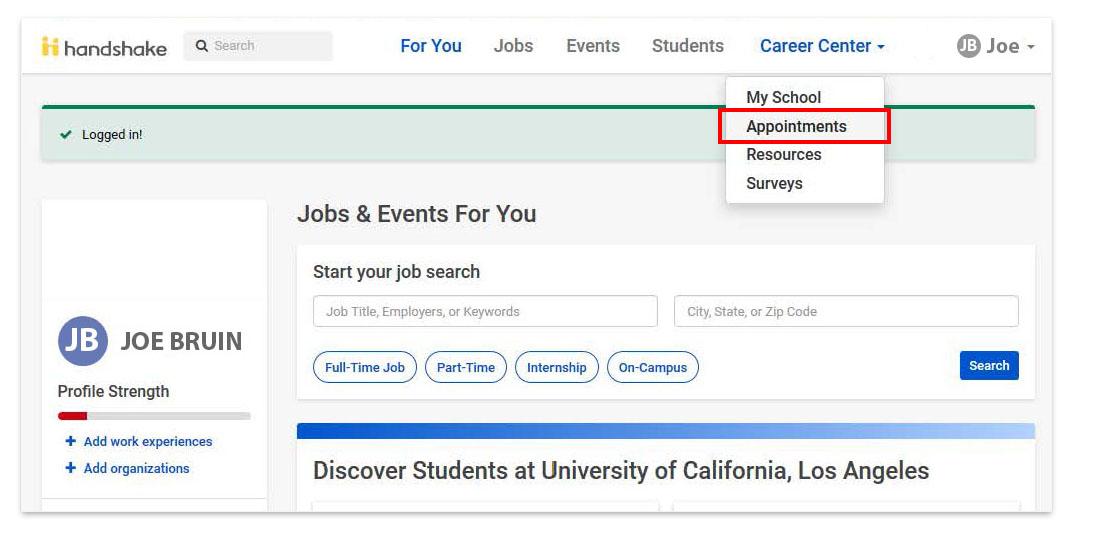
You'll then be taken to the Appointments page, which will have a link to make a new appointment, as well as show any upcoming and previous appointments.
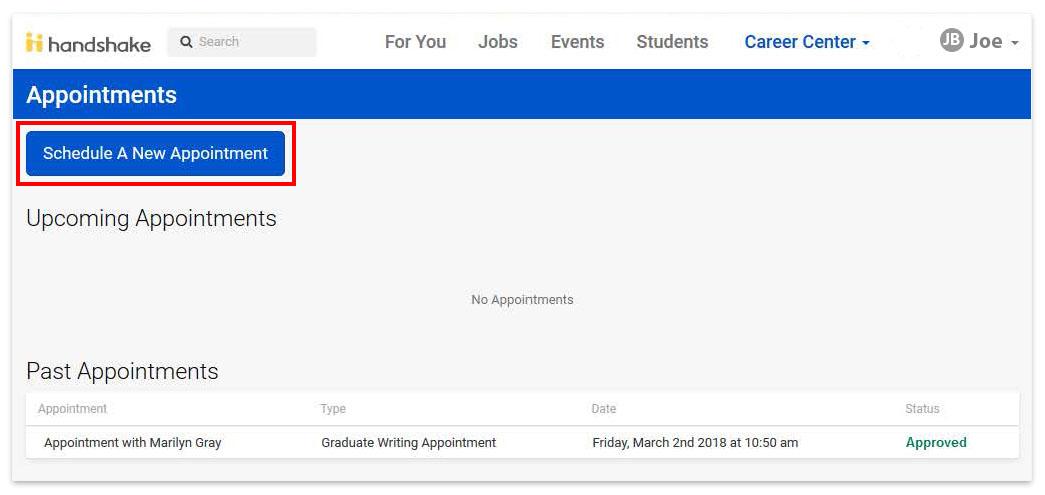
If you click the "Schedule a New Appointment" link, you'll be taken to a screen where you will choose the type of appointment you would like. Because Handshake is also used by the Career Center, you may see additional options, such as career advising appointments. To make a writing appointment, however, click on "Graduate Writing Appointments."
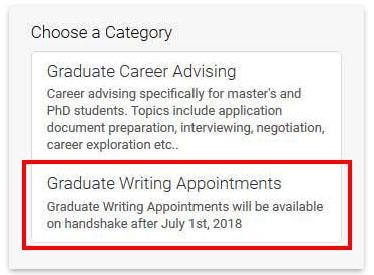
Once you select the type of appointment, you'll be taken to a screen showing the dates and times available. Choose your preferred date, and then click on the appointment you'd like to take.
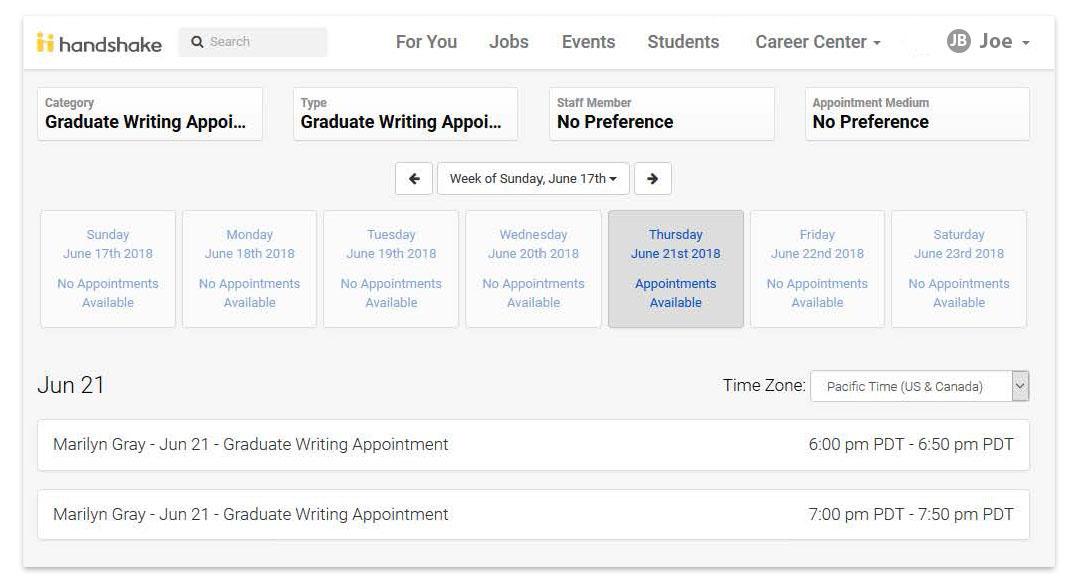
After signing up for your appointment, you will be asked to respond to some questions about yourself and your project. You will also be asked to specify your preferred appointment medium (Face-to-Face or Zoom). If you choose a Zoom appointment, please see our Zoom instructions here. Please bring a printed copy of your project to an in-person appointment (or, if meeting remotely, e-mail the file to gwc@gsa.asucla.ucla.edu.)
Appointment Medium
In-Person Appointments
We are offering some in-person appointments, which are designated in the appointment medium as "face-to-face" plus the location of the appointment. For in-person appointments, please bring a printed copy (preferably two) of your draft to the appointment. Free printing is available in the Graduate Student Resource Center. If you aren't able to bring a hard copy, you should have the document available to read on a laptop.
In-Person Locations: Beginning in Fall 2025, we will be offering more than one in-person location, so you will see the location in face-to-face medium options (Biomedical library, Engineering Library, Graduate Student Resource Center, or Young Research Library). Please contact gwc@gsa.asucla.ucla.edu if you need assistance with in-person appointments.
Zoom Appointments
We offer Zoom appointments if you provide the Zoom link in your Handshake registration form. We designate our Zoom appointments as "Audio Zoom" because we don't require video (and sometimes video is an issue for bandwidth). Here are key tips for Zoom appointments:
- Please provide a Zoom link that does not require an additional password.
- Please use your UCLA professional Zoom account (access here: https://ucla.zoom.us/). Click here for more information about setting up your UCLA Zoom account. If you are not using your pro account, you might have your appointment cut off after 40 minutes.
- Please email your project document to gwc@gsa.asucla.ucla.edu right before the appointment. (UCLA Zoom does not allow document sharing in chat.) Alternatively, it is possible to share a Google doc link in the chat.
Please email the GWC if you have any questions: gwc@gsa.asucla.ucla.edu
Scheduling and Cancellation Policies
Scheduling: Graduate and professional students may schedule two appointments in advance on a first-come, first-served basis, but students are limited to one writing appointment per day. (Groups may make two appointments in a row if more than one group member will attend.) Please consult our policies page for more information.
Cancellation: If you must cancel your appointment, please do so by midnight the night before your appointment date. Late cancellations and no-shows will be penalized. Please consult our policies page for more information.
If you have any questions, Please consult our policies page, e-mail us at gwc@gsa.asucla.ucla.edu, or call (310) 267-4805 between 9am and 5pm on weekdays.